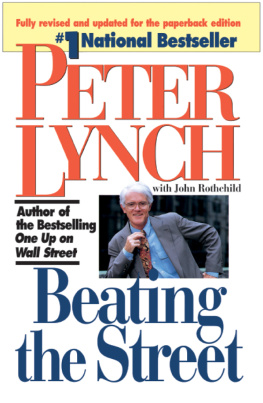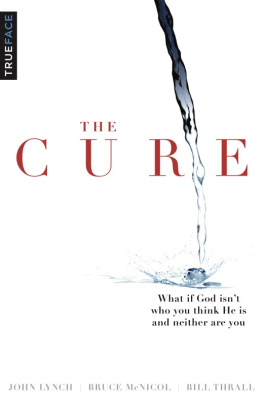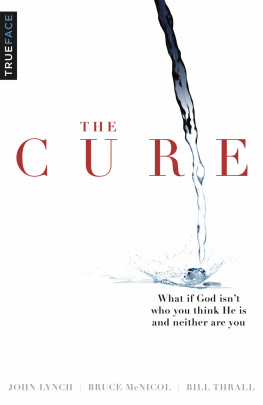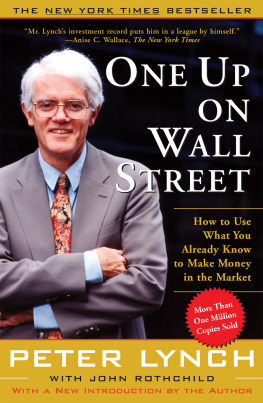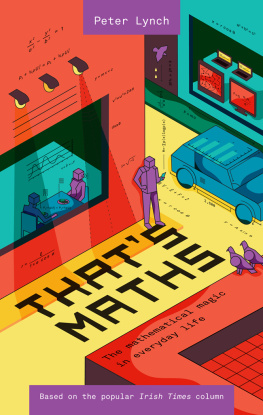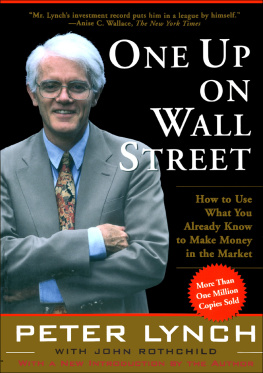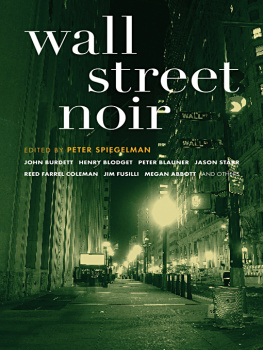Peter Lynch and John Rothchild - Beating the Street
Here you can read online Peter Lynch and John Rothchild - Beating the Street full text of the book (entire story) in english for free. Download pdf and epub, get meaning, cover and reviews about this ebook. year: 2012, publisher: Simon & Schuster, genre: Romance novel. Description of the work, (preface) as well as reviews are available. Best literature library LitArk.com created for fans of good reading and offers a wide selection of genres:
Romance novel
Science fiction
Adventure
Detective
Science
History
Home and family
Prose
Art
Politics
Computer
Non-fiction
Religion
Business
Children
Humor
Choose a favorite category and find really read worthwhile books. Enjoy immersion in the world of imagination, feel the emotions of the characters or learn something new for yourself, make an fascinating discovery.
- Book:Beating the Street
- Author:
- Publisher:Simon & Schuster
- Genre:
- Year:2012
- Rating:3 / 5
- Favourites:Add to favourites
- Your mark:
- 60
- 1
- 2
- 3
- 4
- 5
Beating the Street: summary, description and annotation
We offer to read an annotation, description, summary or preface (depends on what the author of the book "Beating the Street" wrote himself). If you haven't found the necessary information about the book — write in the comments, we will try to find it.
Beating the Street — read online for free the complete book (whole text) full work
Below is the text of the book, divided by pages. System saving the place of the last page read, allows you to conveniently read the book "Beating the Street" online for free, without having to search again every time where you left off. Put a bookmark, and you can go to the page where you finished reading at any time.
Font size:
Interval:
Bookmark:
Develop a Winning Investment Strategywith Expert Advice from The Nations #1 Money Manager *

Peter Lynchs invest in what you know strategy has made him a household name with investors both big and small.
An important key to investing, Lynch says, is to remember that stocks are not lottery tickets. Theres a company behind every stock and a reason companiesand their stocksperform the way they do. In this book, newly revised and updated for the paperback edition, Peter Lynch shows you how you can become an expert in a company and how you can build a profitable investment portfolio, based on your own experience and insights and on straightforward do-it-your-self research. Theres no reason the individual investor cant match wits with the experts, and this book will show you how.
In Beating the Street , Lynch for the first time:
Explains how to devise a mutual fund strategy
Shows how he goes about picking stocks, step-by-step
Describes how the individual investor can improve his or her investment performance to rival that of the experts of the investment clubs.
During PETER LYNCHS thirteen successful years as manager of the Fidelity Magellan Fund, it was the top-ranked general equity mutual fund in the nation. One thousand dollars invested in Magellan in 1977 was worth $28,000 when he handed over the reins of magellan on May 21, 1990.
Since his retirement from the Magellan Fund. Lynch continues as a member of the board of trustees of the Fidelity Group of funds and writes a column for Worth magazine. He lives with his wife. Carolyn, and three daughters in the suburbs of Boston and is the author of the investment classic, One Up on Wall Street .
JOHN ROTHCHILD is the coauthor of One Up on Wall Street . He is the author of several highly acclaimed books on business and finance, among them. A Fool and His Money and Going for Broke . He lives in Miami Beach.


MEET THE AUTHORS, WATCH VIDEOS AND MORE AT
SimonandSchuster.com
THE SOURCE FOR READING GROUPS
COVER DESIGN BY BARRY LITTMANN COVER PHOTOGRAPH BY SIGRID ESTRADA

ALSO BY PETER LYNCH
Learn to Earn
One Up on Wall Street
(with John Rothchild)


SIMON & SCHUSTER PAPERBACKS
Rockefeller Center
1230 Avenue of the Americas
New York, New York 10020
www.SimonandSchuster.com
Copyright 1993, 1994 by Peter Lynch
All rights reserved, including the right to reproduce this book or portions thereof in any form whatsoever.
SIMON & SCHUSTER PAPERBACKS and colophon are registered trademarks of Simon & Schuster, Inc.
Designed by Irving Perkins Associates
Library of Congress Catalog Card Number: 94227861
ISBN-13: 978-0-671-75915-5
ISBN-10: 0-671-75915-9
ISBN-13: 978-0-671-89163-3 (Pbk)
ISBN-10: 0-671-89163-4 (Pbk)
ISBN-13: 978-1-4516-8706-4 (eBook)
To John Rothchild for his amazing talent, hard work, and good humor, which enabled One Up on Wall Street and Beating the Street to occur.
To Peggy Malaspina, who challenged every assumption and played a crucial role in shaping the ideas in both of these books; and to her research staff, who worked overtime assembling data and checking facts: Davida Sherman and Andrew Wolf, backed up by Michael Graber, Christine Coyne, Lyn Hadden, and Erik Masci.
To employees at Fidelity, particularly my associate Evelyn Flynn, but also Bob Hill and the staff of the Fidelity Chart Room, Guy Cerundolo, Bob Beckwitt, Lauren Allansmith, Phil Thayer, and Jacques Perold.
For searching out the facts, no one beats the dedicated staff of Fidelitys Fixed Income and Equity Research Information Centers, especially Shawn Bastien, Karen OToole, and Sheila Collins. Jeff Todd and Christopher Green in the Management Information and Analysis Group provided many of the charts and performance calculations.
Also thanks to editor Bob Bender, his assistant Johanna Li, copy supervisor Gypsy da Silva, and copy editor Steve Messina at Simon & Schuster.
This book would not have happened without the efforts of Doe Coover, a Boston literary agent who marshaled the proposal through its various stages.
John Rothchild thanks his agent, Elizabeth Darhansoff. He was assisted in Miami by Bruce Lemle, who plays a mean game of duplicate bridge.
To my wife, Carolyn, and our daughters, Mary, Annie, and Beth. To my brothers, Eugene Lynch and Thomas Lynch, and my cousin Thomas Leahy.
Thank you for purchasing this Simon & Schuster eBook.
Sign up for our newsletter and receive special offers, access to bonus content, and info on the latest new releases and other great eBooks from Simon & Schuster.

or visit us online to sign up at
eBookNews.SimonandSchuster.com
I turned off my Quotron at the Fidelity Magellan Fund on May 31, 1990. This was exactly 13 years from the day I took the job. Jimmy Carter was president back then, and he admitted to having lust in his heart. I had lust in my heart as welllust for stocks. In the end, I figure Id purchased more than 15,000 of them for investors in Magellanand many more than once. No wonder Id gotten a reputation for never having met a share I didnt like.
My departure was sudden, but it wasnt something I dreamed up overnight. The task of keeping track of so many companies had begun to take its toll by mid-decade, as the Dow hit 2000 and I hit 43. As much as I enjoyed managing a portfolio the size of the GNP of Ecuador, I missed being home to watch the children grow up. They change fast. They almost had to introduce themselves to me every weekend. I was spending more time with Fannie Mae, Freddie Mac, and Sallie Mae than I spent with them.
When you start to confuse Freddie Mac, Sallie Mae, and Fannie Mae with members of your family, and you remember 2,000 stock symbols but forget the childrens birthdays, theres a good chance youve become too wrapped up in your work.
In 1989, with the Great Correction of 1987 already behind us and the stock market sailing along smoothly, I was celebrating my 46th birthday with my wife, Carolyn, and my daughters, Mary, Annie, and Beth. In the middle of the party, I had a revelation. I remembered that my father had died when he was 46 years old. You start to feel mortal when you realize youve already outlived your parents. You start to recognize that youre only going to exist for a little while, whereas youre going to be dead for a long time. You start wishing youd seen more school plays and ski meets and afternoon soccer games. You remind yourself that nobody on his deathbed ever said: I wish Id spent more time at the office.
I tried to convince myself that my children required less of my attention than they had when they were younger. In my heart, I knew the reverse was true. During the Terrible Twos they rush around and bang into things, and parents have to patch them up, but patching up a toddler takes less time and effort than helping adolescents with Spanish homework or the math that weve forgotten, or driving them for the umpteenth time to the tennis court or the shopping mall, or reassuring them after theyve taken the latest hard knocks from being teenagers.
Next pageFont size:
Interval:
Bookmark:
Similar books «Beating the Street»
Look at similar books to Beating the Street. We have selected literature similar in name and meaning in the hope of providing readers with more options to find new, interesting, not yet read works.
Discussion, reviews of the book Beating the Street and just readers' own opinions. Leave your comments, write what you think about the work, its meaning or the main characters. Specify what exactly you liked and what you didn't like, and why you think so.

